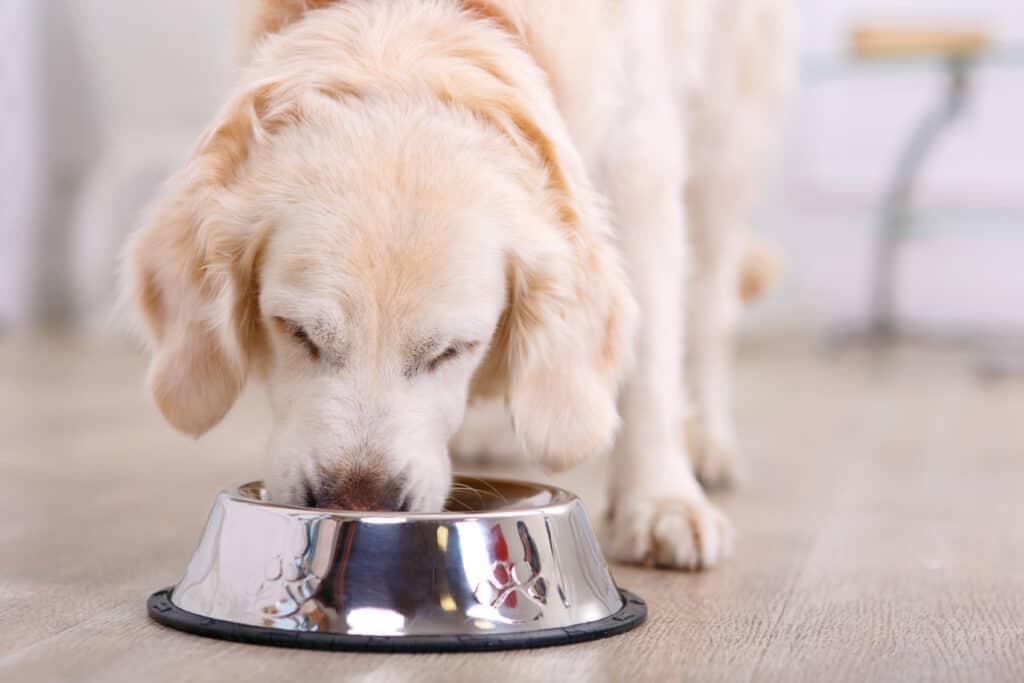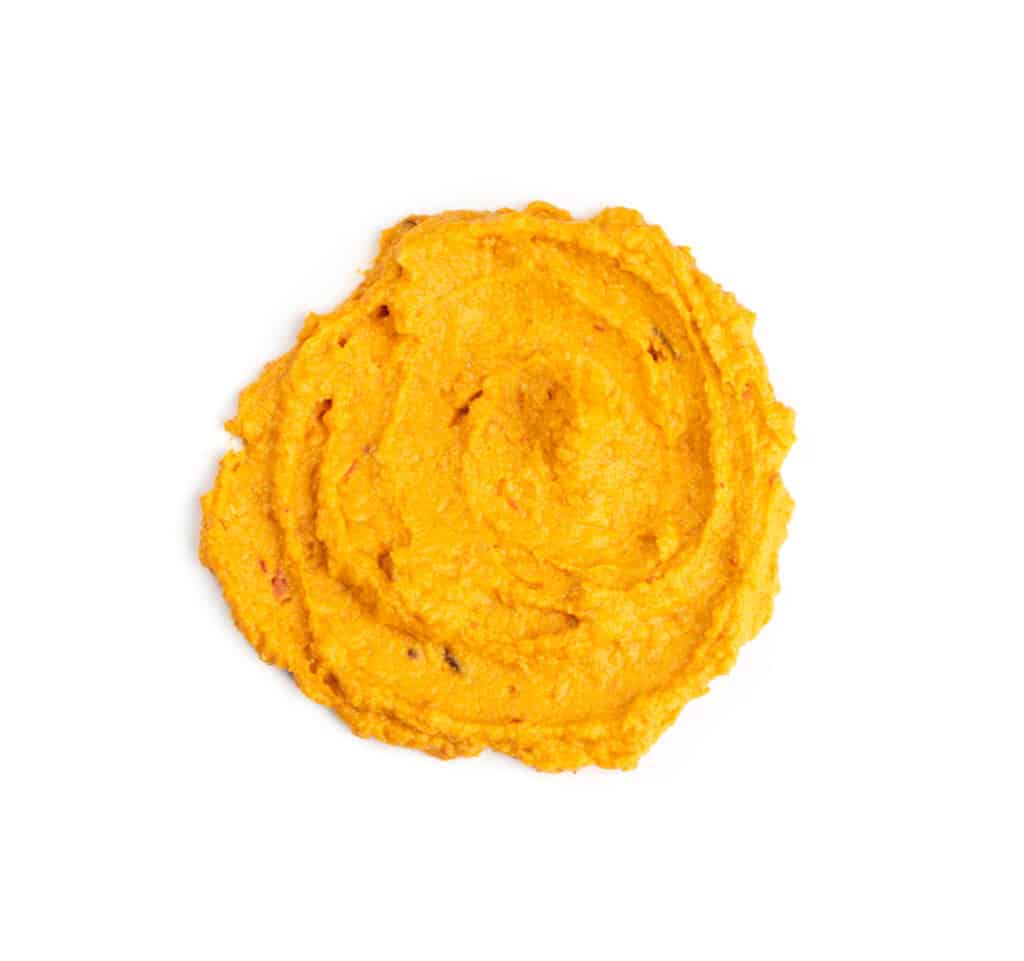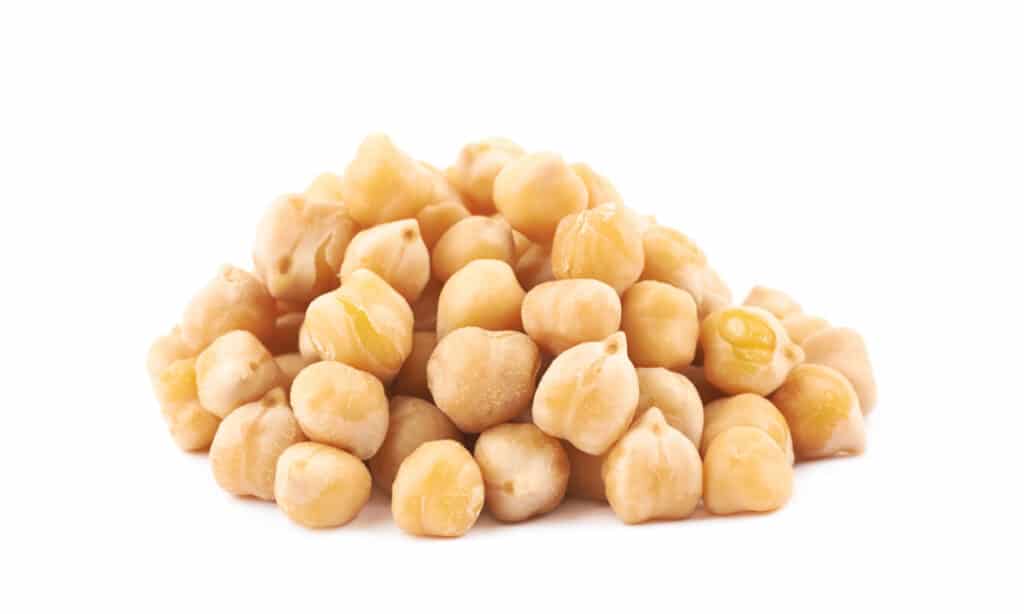Have you ever wondered if dogs can eat hummus safely? What if it’s flavored? It’s a sensible question because hummus is tasty and there are low-fat versions. If your dog likes a tasty treat now and then (and which dog doesn’t!) it might seem like a good option. Let’s find out if dogs can eat hummus and all about the different flavors.
Is Hummus Safe for My Dog to Eat?
Hummus isn’t safe for dogs to eat because it’s a processed food with several different ingredients and not all of them are good for dogs.
While plain chickpeas are not a problem, other ingredients in hummus, like salt, oil, garlic, and onion are toxic to dogs. When it comes to flavored hummus, the risk of ingredients that can make your pooch unwell increases.

Dmytro Zinkevych/Shutterstock.com
Why Can’t Dogs Eat Hummus?
Here are some of the ingredients in hummus that aren’t suitable for dogs:
Garlic
Garlic is toxic to dogs and it’s often an ingredient in basic store-bought hummus. Although the amount used is small, it can cause gastric upset and eventually anemia if it’s a regular food.
This applies to garlic of any type, including raw, cooked, fresh, or dried. The symptoms of anemia in dogs include lethargy, weakness, pale gums, and red urine.
Onions
Some brands of hummus contain onion powder which is toxic to dogs. It causes stomach upset, vomiting, and panting. Additionally, it damages their red blood cells just like garlic.
Lemon juice
The citric acid in lemon juice is an irritant that can cause an upset stomach and vomiting.
Salt
Salt causes dehydration and hypertension, so it’s a bad food for all types of animals including dogs. In large quantities, it causes sodium poisoning. While there’s only a small amount of salt in hummus, it all adds up if your dog is eating other “human” foods too.
Spices
Anything spicy creates gastric upset and bloating in dogs. The spices might not be toxic, but if they make your pooch uncomfortable then it’s best to avoid them.
High Fat
Hummus is high in fat. It’s a rich, fatty food that can pile the pounds on your dog. Weight gain and obesity considerably reduces a dog’s quality of life and their lifespan too. Fatty foods can also lead to pancreatitis which is painful and makes dogs seriously unwell.
Pancreatitis is when the pancreas becomes inflamed and begins to digest itself. This is as painful as it sounds. Pancreatitis also creates vomiting and severe lethargy, so it’s definitely something to avoid.
There are low-fat versions of hummus that don’t contain so much oily fat, but they still have all or some of the ingredients above, so reduced-fat hummus is not safe for dogs either.
Is Flavored Hummus Safe for Dogs?
Dogs can’t eat flavored hummus safely because it still contains garlic, onion, lemon juice, spices, and lots of fat. Hummus that’s flavored with onion, garlic, chocolate, nuts, raisins, and grapes are particularly harmful to dogs and should always be avoided.

iStock.com/Oksana Ermak
Can Dogs Eat Low-Fat Hummus?
As we’ve learned, low-fat hummus doesn’t contain as much fat that can lead to pancreatitis and obesity in dogs, but it still contains lemon juice, garlic, onion, and a host of possible flavorings, so low-fat hummus is not safe for dogs to eat either.
What Is Hummus?
Hummus is a tasty dip and a great alternative to butter or other spreads. It is especially delicious with carrots, celery sticks, on flatbreads, or with falafels, but only if you’re a human!
It’s a Middle Eastern food that’s particularly popular in the Levant because it follows Jewish dietary laws but is eaten worldwide. It’s also spelled houmous or hommus, and the name comes from the Arabic word for chickpea because chickpeas are the main ingredient.
The largest dish of hummus, according to the Guinness World Record, swaps each year between Lebanon and Israel’s chefs. Lebanon held the title in 2021 with a dish of hummus weighing 23,040 pounds. It contained eight tons of chickpeas, 150 pounds of olive oil, and was prepared by 300 chefs!
Can Dogs Eat Chickpeas?
Although dogs cannot eat hummus safely, they can eat the main ingredient of hummus which is chickpeas.
Chickpeas (Cicer arietinum) are a legume in the Fabaceae family and are also known as gram, garbanzo beans, and Egyptian peas. The oldest known remains of chickpeas were found in the Middle East. These remains are 9,500 years old, meaning chickpeas are one of the earliest grown legumes. They even pre-date wheat.
Chickpeas are full of fiber and protein, so they make a healthy and filling snack or addition to your dog’s meal. Here are the health benefits of chickpeas (for humans and dogs!):
- Protein – essential for building muscles
- Fiber – important for a healthy digestive system
- Magnesium – essential for the production of red blood cells
- Iron – helps build red blood cells and fends off tiredness
- Selenium – boosts immune systems
- Vitamin B – important for metabolism, energy, and healthy skin
Chickpeas are a healthy addition to your dog’s diet, but it’s important to avoid highly processed chickpeas. Natural unprocessed chickpeas are the best form for dogs.
Tinned chickpeas are often preserved in salt water. We know that salt is bad for dogs because it can cause dehydration and hypertension, so look for low-sodium tinned chickpeas and always thoroughly rinse away any salty water.
Check the tin for any other ingredients too. The fewer there are the better.

timquo/Shutterstock.com
What Do I Do If My Dog Has Eaten Hummus?
Don’t panic. The ingredients in plain hummus that are bad for dogs are included in small amounts so it’s unlikely to do serious harm if only a little has been ingested. Keep an eye on your dog and provide plenty of fresh water. If they have a stomach upset, feed them plain food like chicken and rice, and if the upset continues speak to a veterinarian.
If they’ve eaten a lot of hummus or it contained extra garlic, onion, chocolate, nuts, or grapes then it’s best to speak to your veterinarian, especially if your dog is small, old, or a puppy.
Can Cats Eat Hummus?
Even if your cat chooses to eat hummus, which is unlikely, it should be avoided. The same ingredients that are toxic to dogs are toxic to cats, too.

Sergio Photone/Shutterstock.com
Other Foods to Avoid Feeding Dogs
Alongside hummus, there are other foods that aren’t suitable for dogs. Here’s a list of the most common household foods that dogs can’t eat:
- Chocolate
- Grapes
- Raisins
- Sultanas
- Onions
- Garlic
- Macadamia nuts
- Avocado
- Foods containing alcohol
- Salt
- Artificial sweetener (xylitol)
Any processed foods that contain the above are not safe for dogs. For example, a pizza slice with onion on it, garlic bread, chocolate-covered raisins, or smoothies with avocado are all bad for dogs.
We can now see why dogs can’t eat hummus safely. While it won’t cause an immediate serious illness (unless it contains excessive onion or garlic), hummus contains ingredients hat dogs can’t eat.
Flavored hummus is also bad for dogs because it contains the same base ingredients as hummus, with the added risk of other toxic foods.
If you want to give your dog a healthy snack, chickpeas are a good, safe option. If you’re looking for a high-quality regular dog food, check out our healthy food for dogs.

iStock.com/darrenplatts123
Up Next
The post Can Dogs Eat Hummus Safely? What If It’s Flavored? appeared first on AZ Animals.
from Animal News, Facts, Rankings, and More! - AZ Animals https://ift.tt/OxGQYZ3